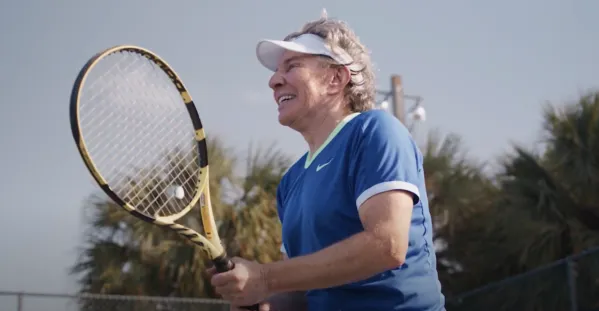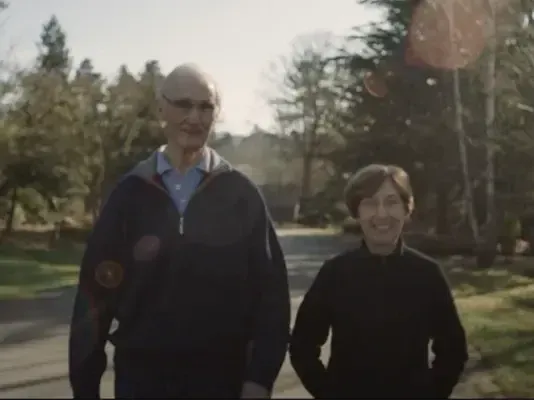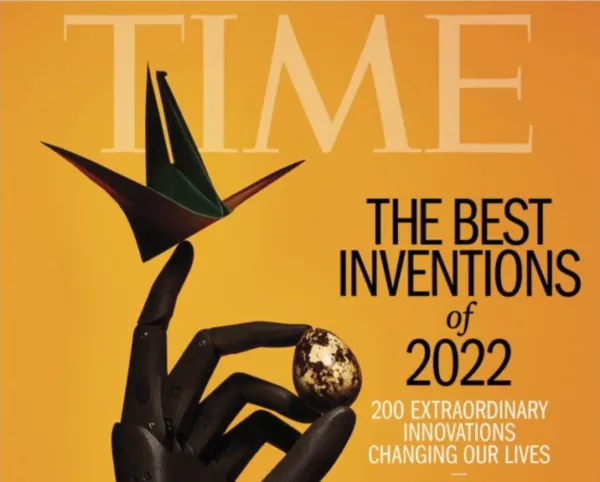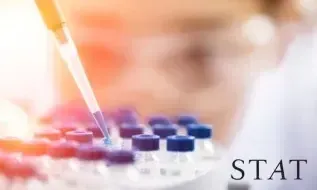
Go further with cancer screening
Introducing Galleri®, the first-of-its-kind multi-cancer early detection test that looks for a signal shared by 50+ types of cancer with a single blood test.1
The Galleri test does not detect a signal for all cancers and not all cancers can be detected in the blood. False positive and false negative results do occur.
What is the Galleri test?
Galleri redefines what’s possible. Only 5 cancers have recommended screening tests.2 Using Galleri in addition to these tests can increase the chance of finding cancer early, to allow for earlier treatment.1,3
With a single blood test, Galleri screens for a signal shared by multiple cancers that would otherwise go unnoticed.1,4 If a cancer signal is detected, Galleri predicts the tissue type or organ associated with the cancer signal with 88% accuracy* to help guide follow-up diagnostic testing which may include lab work or imaging to confirm cancer.4
*In the PATHFINDER study, Cancer Signal Origin (CSO) prediction accuracy was 88% for participants with a cancer diagnosis among study participants with a "Cancer Signal Detected" test result.
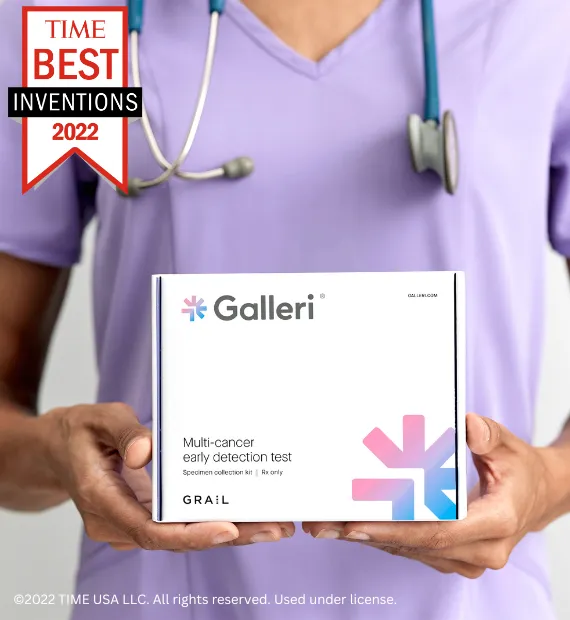
Who is Galleri for?
Age is the biggest risk factor for cancer. In fact, adults over age 50 are 13 times more likely to have cancer compared to people under the age of 50.5 Cancer risk increases for everyone as they age regardless of family history—only 5% to 10% of cancers are inherited.5,6
The Galleri test is recommended for adults with an elevated risk for cancer, such as those aged 50 or older.
The Galleri test is available by prescription only.
Use of Galleri is not recommended in individuals who are pregnant, 21 years old or younger, or undergoing active cancer treatment.



Healthcare Providers
Healthcare Providers
Healthcare Providers
I am a healthcare provider interested in offering the Galleri test to my patients

Employers
Employers
Employers
I represent an employer interested in offering the Galleri test to my organization’s employees

Health Systems
Health Systems
Health Systems
I represent a health system interested in making the Galleri test available to my patient population
Sign up for more information about Galleri
Learn how screening with Galleri has made a difference for these patients
Supported by robust clinical data, Galleri sets the standard for multi-cancer early detection
20,000+ individuals participated in large clinical studies1,4
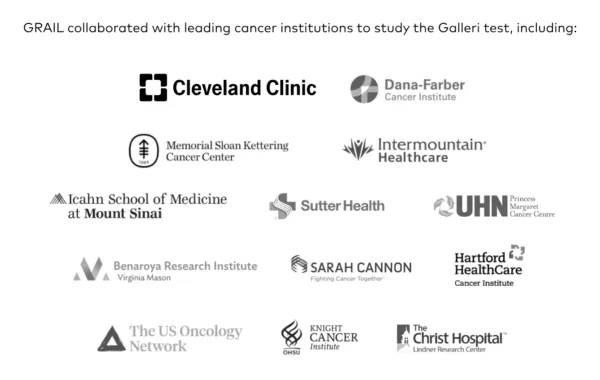
Resources
Have more questions?
Please answer the following questions to fill in the appropriate form.
You can also contact us at (833) 694‑2553 or use the chat feature on the bottom-right of this page for additional help.
-
What describes you best?
-
What are you looking for?
-
Fill in the form
We care about your privacy. Our Privacy Policy
Billing Support
We care about your privacy. Our Privacy Policy
We care about your privacy. Our Privacy Policy
We care about your privacy. Our Privacy Policy
We care about your privacy. Our Privacy Policy
We care about your privacy. Our Privacy Policy
We care about your privacy. Our Privacy Policy
Do you represent a first responder or firefighter organization? Use this form instead.
We care about your privacy. Our Privacy Policy
The Galleri test is recommended for use in adults with an elevated risk for cancer, such as those aged 50 or older. The Galleri test does not detect all cancers and should be used in addition to routine cancer screening tests recommended by a healthcare provider. Galleri is intended to detect cancer signals and predict where in the body the cancer signal is located. Use of Galleri is not recommended in individuals who are pregnant, 21 years old or younger, or undergoing active cancer treatment.
Results should be interpreted by a healthcare provider in the context of medical history, clinical signs and symptoms. A test result of No Cancer Signal Detected does not rule out cancer. A test result of Cancer Signal Detected requires confirmatory diagnostic evaluation by medically established procedures (e.g. imaging) to confirm cancer.
If cancer is not confirmed with further testing, it could mean that cancer is not present or testing was insufficient to detect cancer, including due to the cancer being located in a different part of the body. False-positive (a cancer signal detected when cancer is not present) and false-negative (a cancer signal not detected when cancer is present) test results do occur. Rx only.
The GRAIL clinical laboratory is certified under the Clinical Laboratory Improvement Amendments of 1988 (CLIA) and accredited by the College of American Pathologists. The Galleri test was developed and its performance characteristics were determined by GRAIL. The Galleri test has not been cleared or approved by the Food and Drug Administration. The GRAIL clinical laboratory is regulated under CLIA to perform high-complexity testing. The Galleri test is intended for clinical purposes.
Klein EA, Richards D, Cohn A, et al. Clinical validation of a targeted methylation-based multi-cancer early detection test using an independent validation set. Ann Oncol. 2021;32(9):1167-77. DOI:https://doi.org/10.1016/j.annonc.2021.05.806.
US Preventive Services Task Force. Recommendations Cancer. Accessed 7Mar2023. https://www.uspreventiveservicestaskforce.org/uspstf/topic_search_results.
Schrag D, McDonnall CH, Naduld L, et al. PATHFINDER: A Prospective Study of a Multi-Cancer Early Detection Blood Test. Presentation at European Society of Medical Oncology (ESMO) Congress September 9-13, 2022; Paris, France.
Hubbell E, Venn O, Shanmugam A. Shared Cancer Signal: Evidence from Cross-Training. Presentation at USC Computational Biology Symposium; May 19-21, 2022; Los Angeles, CA.
Surveillance, Epidemiology, and End Results (SEER) Program (www.seer.cancer.gov) SEER*Stat Database Incidence - SEER Research Limited-Field Data, 21 Registries, Nov 2020 Sub (2000-2018) - Linked To County Attributes -Time Dependent (1990-2018) Income/Rurality, 1969-2019 Counties, National Cancer Institute, DCCPS, Surveillance Research Program, released April 2021, based on the November 2020 submission. Risk Factor Data on file: American Cancer Society Cancer Prevention Studies II/III.
NIH/National Cancer Institute. Genetic testing for inherited cancer susceptibility syndromes. Accessed 3Mar2023. https://www.cancer.gov/about-cancer/causes-prevention/genetics/genetic-testing-fact-sheet.
American Cancer Society. Cancer Facts & Figures 2022. Atlanta: American Cancer Society; 2022 https://www.cancer.org/research/cancer-facts-statistics/all-cancer-facts-figures/cancer-facts-figures-2022.html. Data on file GA-2021-0065.





